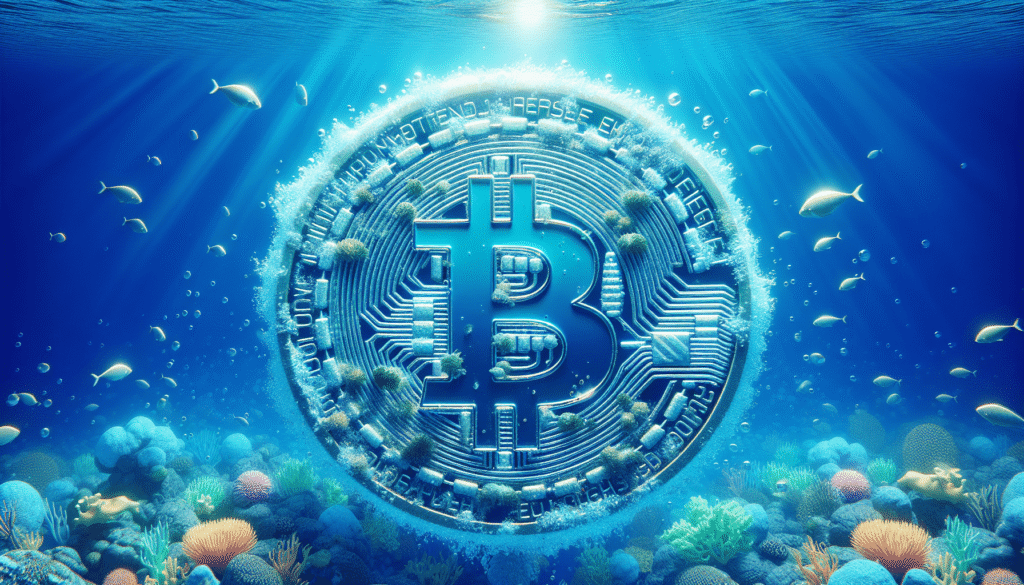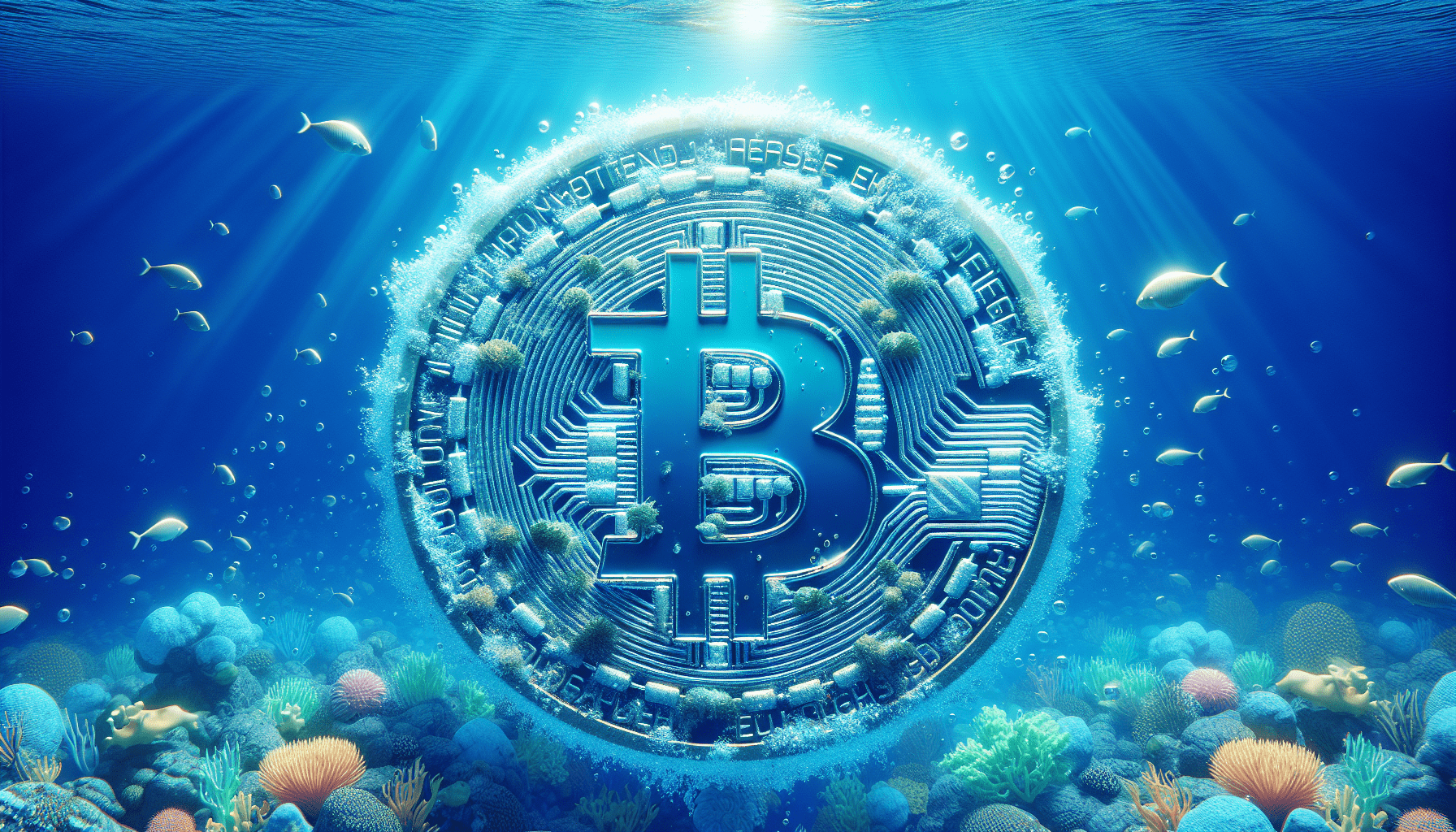Have you ever wondered how innovative technology, like cryptocurrency, can play a part in addressing pressing environmental issues such as ocean pollution? As we live in an increasingly digital world, the potential uses and impacts of cryptocurrency are evolving and expanding in ways that were once unimaginable. While it might seem surprising that digital currencies could play a role in cleaning up our oceans, this kind of integration represents the cutting edge of environmental conservation efforts in the 21st century.
The oceans are our planet’s lifeblood, covering over 70% of the Earth’s surface and essential for maintaining life. Yet, pollution, particularly plastic waste, poses a serious threat to marine life, human health, and the planet’s climate. The intersection of cryptocurrency and ocean cleanup projects provides an exciting frontier for both tech and environmental enthusiasts, offering innovative solutions that could transform the way we approach environmental conservation.

Understanding Cryptocurrency and Its Impact
Before delving into its role in ocean cleanup efforts, it’s important to understand what cryptocurrency is and how it works. Cryptocurrencies are digital or virtual currencies that use cryptography for security, making them difficult to counterfeit. The most well-known example is Bitcoin, but there are thousands of different cryptocurrencies available today.
The Basics of Cryptocurrency
Cryptocurrency operates on technology known as blockchain, a decentralized system that records all transactions across a network of computers. This system offers transparency, security, and speed, allowing for peer-to-peer exchanges without the need for intermediary banks. As a digital asset, cryptocurrency can be bought, sold, or traded in a manner similar to stocks, but it has also sparked a plethora of new uses beyond simple transactions.
Environmental Concerns
Interestingly, some cryptocurrencies have drawn criticism for their environmental impacts, mainly due to the energy-intensive process known as mining. Mining cryptocurrencies like Bitcoin involves solving complex mathematical problems to verify transactions, which requires significant computational power. This has raised concerns about the carbon footprint associated with cryptocurrency mining. Despite these challenges, the sector is evolving, with several novel initiatives working towards environmentally friendly crypto practices, including in the renewable energy sector.
Ocean Pollution: A Growing Crisis
To fully appreciate the role of cryptocurrency in ocean clean-ups, one must first understand the scope of ocean pollution. Oceans absorb about a quarter of the carbon dioxide produced by human activity, and their health is crucial to regulating the Earth’s climate.
The Scope of the Problem
The oceans are teeming with life, yet pollution significantly threatens this biodiversity. Approximately 8 million metric tons of plastic enter the oceans annually, posing risks to marine life through ingestion or entanglement. This pollution comes from various sources, including land runoff, sewage discharge, industrial waste, and maritime activities. Moreover, the problem of microplastics, tiny fragments of plastic that spread throughout marine environments, adds a layer of complexity to cleanup efforts.
Impact on Marine Life and Human Health
Not only do plastics and other pollutants adversely affect marine organisms, but they also have a cascading effect throughout the food chain, ultimately impacting human health. Seafood contaminated with plastics or other pollutants can introduce harmful chemicals into human bodies, leading to health issues over time. The presence of these pollutants also disrupts ecosystems, altering habitats and possibly leading to the depletion of important species.

Combining Tech and Nature: How Crypto Can Help
The integration of cryptocurrency and ocean cleanup efforts represents a pioneering approach, seeking to address pollution with the power of emerging digital technologies. Through various models and initiatives, crypto is already making a tangible difference in protecting and preserving our water bodies.
Tokenization for Funding and Awareness
One of the primary ways crypto is contributing to ocean cleanups is through tokenization. Tokenization involves creating a digital token that represents a certain value or asset. For ocean cleanups, this can be achieved by developing digital tokens dedicated to raising funds and awareness for environmental projects. These tokens can be bought, sold, or traded like other cryptocurrencies, with funds being channeled into cleanup operations.
For instance, certain organizations are using specific crypto tokens to fund their marine conservation efforts. By tying the value of a token to an environmental initiative, these groups incentivize the purchase of tokens, driving up their value while simultaneously creating financial support for ocean conservation projects.
Blockchain for Transparency and Efficiency
Another major benefit of crypto technology is the use of blockchain for ensuring transparency and efficiency in ocean cleanup projects. Blockchain’s decentralized ledger system allows for the detailed and immutable recording of transactions, which can be leveraged to track and authenticate the progress of conservation efforts. For example, organizations involved in ocean clean-ups can use blockchain to provide stakeholders with transparent reports on how funds are used, track the quantity of waste collected, and verify the impact of specific projects.
Engaging Communities and Fostering Collaboration
Cryptocurrency can also drive community engagement and collaboration in ocean protection efforts. By initiating community-driven token models or incentivizing volunteer efforts through blockchain reward systems, cryptocurrencies bring individuals together for a common environmental cause. This approach encourages public participation, giving people a real sense of contribution and ownership over environmental solutions.
Case Studies: Crypto in Action
To illustrate the reality of crypto’s role in ocean cleanup, examining real-world cases where this technology is being applied can shed further light on its potential and effectiveness.
The Ocean Cleanup and Cryptocurrencies
The Ocean Cleanup, a Dutch non-profit organization, is on the charge of developing advanced technological systems to rid the oceans of plastic. While this organization’s primary funding is not through cryptocurrencies, there is potential for collaboration or inspiration for using token models to enhance their funding streams or to facilitate innovation in their cleanup technologies.
Plastic Bank: From Waste to Asset
Plastic Bank provides a successful model of how blockchain and cryptocurrency can contribute to ocean cleanup. By setting up collection points in vulnerable communities, they allow locals to deposit plastic waste in exchange for digital tokens. These tokens, which operate on blockchain technology, can then be used to purchase necessities or pay for services, creating a circular economy that benefits the environment and local populations.
The combination of blockchain for efficiently tracking deposits and cryptocurrencies as an exchange medium transforms waste into a valuable asset while reducing ocean pollution.
Opportunities and Challenges
While the integration of cryptocurrency and ocean cleanup efforts holds great promise, it is vital to understand both the opportunities and the challenges in adopting such an approach.
Benefits and Opportunities
In terms of benefits, cryptocurrencies offer a global reach and the possibility of attracting a diverse range of investors and supporters for ocean cleanup projects. Moreover, the use of blockchain ensures transparency and accountability, which is crucial for maintaining public trust and securing ongoing support.
The concept of a decentralized form of currency aligns well with the decentralized nature of environmental issues, which require solutions beyond the efforts of any one organization or government.
Potential Challenges
Despite the advantages, there are still challenges to overcome. The ecological footprint of cryptocurrency mining must continue to be addressed, ideally through the adoption of eco-friendly practices or technologies. Additionally, the ever-shifting regulatory landscape surrounding cryptocurrencies could present hurdles, as different countries have varying regulations that could affect international collaboration on ocean projects.
Moreover, widespread acceptance and understanding of cryptocurrency among the general public and potential stakeholders are essential. Education and advocacy will play a critical role in bridging knowledge gaps and driving the adoption of crypto-based solutions for ocean conservation.
Future Perspectives: A Greener Path Forward
As we look towards the future, the potential for cryptocurrencies to contribute significantly to environmental solutions, such as the cleanup of our oceans, could see continued growth. Innovations in cryptocurrency technology and increased awareness about environmental issues pave the way for creative collaborations between the tech and environmental sectors.
Encouraging Sustainable Crypto Practices
To maximize the positive impact of cryptocurrency on ocean cleanup projects, it is crucial to invest in sustainable crypto practices. This includes exploring renewable energy sources for mining operations and developing new blockchain technologies that require less computational power.
Building Partnerships for Greater Impact
Forging strong partnerships between crypto companies, environmental groups, governments, and community stakeholders is essential for scaling efforts and achieving systemic change. Collaboration can lead to the pooling of resources, expertise, and technology, amplifying the impact of ocean cleanup projects.
Conclusion
In the quest to protect our world’s oceans, cryptocurrencies offer an innovative toolkit that could complement traditional conservation techniques. By harnessing the power of crypto for funding, community engagement, and transparency, we have the potential to make significant strides in addressing the urgent problem of ocean pollution. While challenges persist, with continued collaboration, innovation, and dedication to sustainable practices, the role of cryptocurrencies in ocean cleanup projects could lead to transformative outcomes for our planet’s most precious resource.

